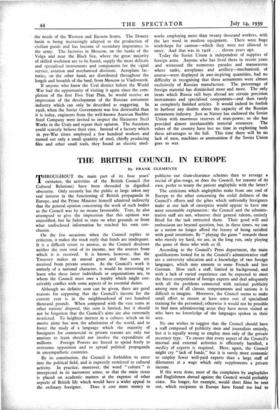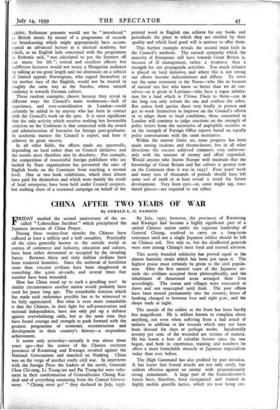THE BRITISH COUNCIL IN EUROPE
By FRANK CLEMENTS
THROUGHOUT the main part of its four years' existence, the activities of the British Council (for Cultural Relations) have been shrouded in dignified obscurity. Only recently has the public at large taken any real interest in the functioning of British propaganda in Europe, and the Prime Minister himself admitted indirectly that the general opinion concerning the work of such bodies as the Council was by no means favourable. True, he also attempted to give the impression that this opinion was unjustified, but he failed to state on what grounds or from what undisclosed information he reached his own con- clusion.
On the few occasions when the Council replies to criticism, it makes the stock reply that funds are inadequate. It is a difficult retort to answer, as the Council discloses neither the sum total of its income, nor the sources from which it is received. It is known, however, that the Treasury makes an annual grant and that sums are received from private sources. As the Council's work is entirely of a national character, it would be interesting to learn who these latter individuals or organisations are, to whom the Council must owe a loyalty which might con- ceivably conflict with some aspects of its essential duties.
Although no definite sum can be given, there are good reasons for supposing that the Council's income for the current year is in the neighbourhood of two hundred thousand pounds. When compared with the vast sums at other nations' disposal, this sum is limited, but it should not be forgotten that the Council's aims are also extremely restricted. To heighten interest in a culture, which on its merits alone has won the admiration of the world, and to foster the study of a language which the majority of foreigners for commercial or private reasons are only too anxious to learn should not involve the expenditure of millions. Foreign Powers are forced to spend freely to overcome opposition and to spread political propaganda in unsympathetic countries.
By its constitution, the Council is forbidden to enter into the political field, and is expressly restricted to cultural activity. In practice, moreover, the word " culture " is interpreted in its narrowest sense, so that the main stress is placed on academic matters at the expense of other aspects of British life which would have a wider appeal to the ordinary foreigner. Does it cost more money to publicise our slum-clearance schemes than to arrange a recital of glee-songs, or does the Council, for reasons of its own, prefer to weary the patient anglophile with the latter?
The criticisms which anglophiles make from one end of Europe to the other concerning the stolid dullness of the Council's efforts and the gibes which unfriendly foreigners make at our lack of enterprise would appear to have one most reasonable explanation: the Council and the adminis- trative staff are not, whatever their general talents, entirely fitted for the task entrusted them. Their good will and enthusiasm are beyond question, but, in these times, we can as a nation no longer afford the luxury of being satisfied with good intentions. By " playing the game " towards those who merely try hard, we are, in the long run, only playing the game of those who wish us ill.
According to the Council's Press department, the main qualifications looked for in the Council's administrative staff are a university education and a knowledge of two foreign languages, which may amount to some French and less German. How such a staff, limited in background, and with a lack of varied experience can be expected to meet the fierce competition of foreign experts and deal adequately with all the problems connected with national publicity among men of all classes, temperaments and nations it is difficult to imagine. Moreover, the Council seems to make small effort to ensure at least some sort of specialised training for the personnel; otherwise it would not be possible to find men administering areas they have never visited or who have no knowledge of the languages spoken in their area.
No one wishes to suggest that the Council should have a staff composed of publicity men and journalists entirely, but it is equally wrong to employ men only of the private secretary type. To ensure that every aspect of the Council's internal and external activities is efficiently handled, a medley of experts is required. Here, again, the Council might cry " lack of funds," but it is surely more economic to employ fewer well-paid experts than a large staff of dilettantes at a wage which only supplements a private income.
If this were done, most of the complaints by anglophiles and Englishmen abroad against the Council would probably cease. No longer, for example, would short films be sent out, which recipients in Europe have found too bad to Esthonian peasants would not be " introduced " to British music by means of a programme of records for broadcasting which might appropriately have accom- ranied an advanced lecture at a musical academy, but which, as an English lady concerned with the programme in Esthonia said, " was calculated to put the listeners off our music for life "; retired and excellent officers but indifferent lecturers would not weary a Hungarian audience by talking at too great length and too abstrusely on a subject of limited appeal; Norwegians, who regard themselves as the mother race of the English, would not be treated in roughly the same way as the Swedes, whose natural tendency is towards German culture.
These random examples, chosen because they reveal in different ways the Council's main weaknesses—lack of experience, and over-centralisation in London—could certainly be added to by anyone who has been in contact with the Council's work on the spot. It is most significant that the only activity which receives nothing but favourable criticism on the Continent is that connected with the award and administration of bursaries for foreign post-graduates. In academic matters the Council is expert, and here it achieves its great success.
In all other fields, the efforts made are spasmodic, depending on local rather than on Council initiative, and the results must therefore also be desultory. For example, the competition of resourceful foreign publishers who are backed by State organisations has prevented the sales of English books on the Continent from reaching a normal level. One or two book exhibitions, which must almost have paid for themselves and which were mainly the result of local enterprise, have been held under Council auspices, but nothing short of a sustained campaign on behalf of the printed word in English can achieve for our books and periodicals the place to which they are entitled by their quality and which local good will is anxious to offer them.
This further example reveals the second main fault in the Council's methods. The natural sympathy which the majority of Europeans still have towards Great Britain is, because of ill management, rather a weakness than a strength for our propaganda activities. Too much reliance is placed on local initiative, and where this is not strong our efforts become indiscriminate and diffuse. To serve out the same treatment to the Norse—who like us because of natural ties but who know us better than we do our- selves—as is given to Latvians—who have a vague admira- tion for a land which is Ultima Thule to them—can in the long run only irritate the one and confuse the other. But unless both parties shout very loudly in protest and get to work themselves to improve on the Council's efforts or to adapt them to local conditions, those concerned in London will continue to judge reactions on the strength of polite letters from the secretaries of anglophile societies or on the strength of Foreign Office reports based on equally polite conversations with the same secretaries.
Within the narrow limits set, some progress has been made among students and theatre-lovers, but in all other directions the success achieved compares very unfavour- ably with the amount of money and effort expended_ Would anyone who knows Europe well maintain that the knowledge of Great Britain and her culture is greater now on the Continent than it was in 1935? Four years' work and many tens of thousands of pounds should have left some sort of mark or at least reveal a trend for future development. Very keen eyes—or, some might say, rose- tinted glasses—are required to see either.











































 Previous page
Previous page